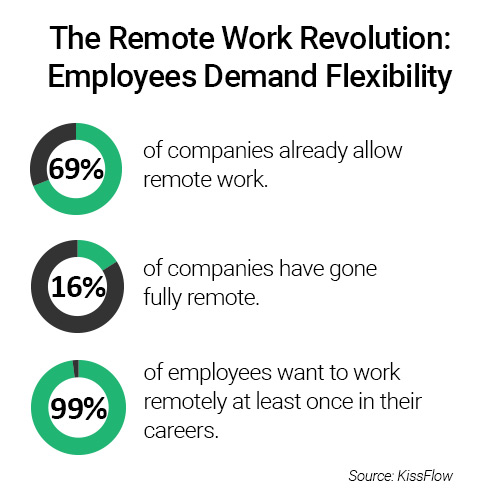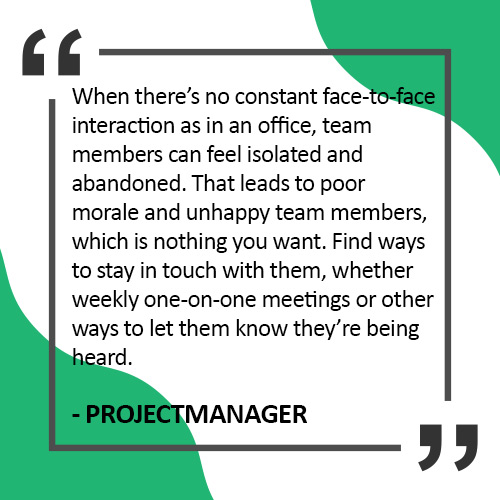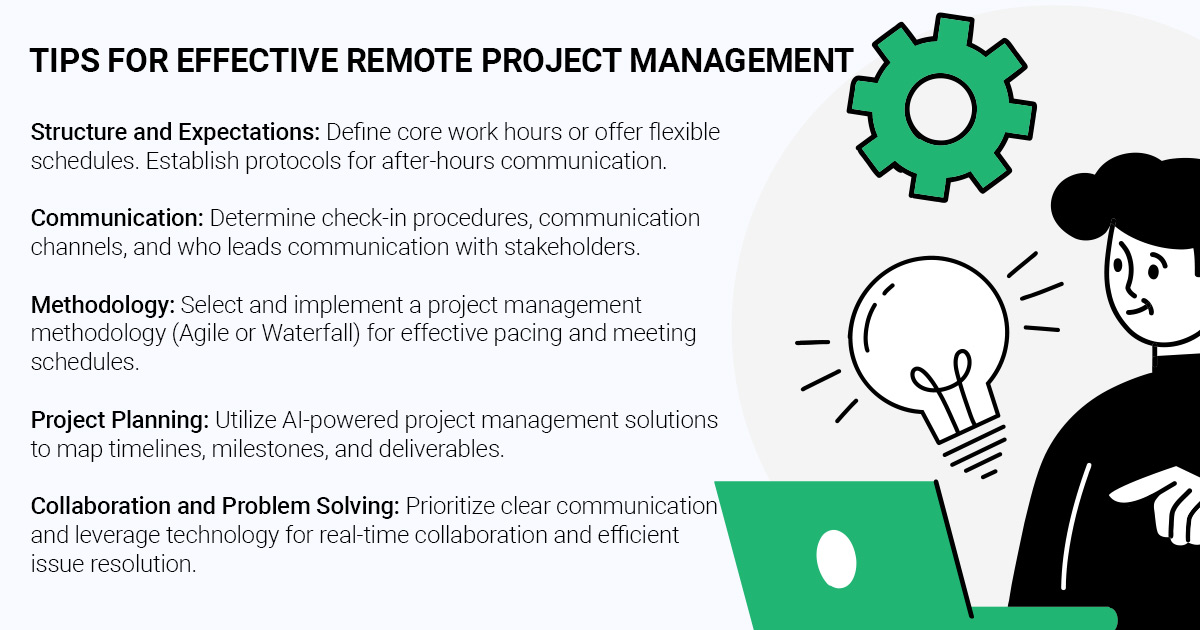
Remote work arrangements are becoming increasingly common. In 2023, a substantial 12.7% of full-time employees worked from remote locations. Interestingly, this trend is expected to continue, with projections indicating that the number of remote workers in the United States will reach 32.6 million by 2025. The information technology (IT) sector stands out as a leader in remote work adoption, likely due to the nature of the work itself being well-suited to a remote environment. This shift towards remote work presents both opportunities and challenges, particularly for the field of remote project management.
According to research by Wrike, remote project management enhances team productivity by 20%. APMG International found that 73% of organizations saw improved project delivery with virtual management. However, challenges arise: 46% of project managers struggle with virtual communication, and 43% find managing timelines difficult, per KPMG. McKinsey & Company found that 55% of managers struggle to build trust virtually. Consequently, 52% of organizations are investing in virtual project management training, according to PMI. With effective remote project management strategies, you can ensure successful project execution in a geographically dispersed work environment.
So, how do you effectively manage a remote team? In this article, we'll discuss the unique challenges and advantages of managing remote teams and how modern technology solutions such as artificial intelligence-powered predictive analytics help in effective remote project management for managing remote teams.
What Is Remote Project Management?
Remote project management is the art of planning, organizing, and overseeing a project to ensure it stays on track, within budget, and meets its goals, all while team members are working remotely. It's worth noting that in this setup, even the remote project managers themselves might be working remotely.
In simple terms, remote project management is about applying project management principles in remote or hybrid work settings—but with an added layer of complexity: ensuring effective communication and collaboration across geographical distances. Here's where advanced analytical solutions such as predictive analytics come in. Through cloud-based platforms and project execution solutions, project teams can communicate, share resources, and track progress in real-time, regardless of their physical location.
The benefits of remote project management are undeniable, and predictive analytics can further enhance them. How, you ask? Let’s look at the benefits:
What Are the Benefits of Remote Project Management?
 Remote project management offers numerous benefits to organizations. It simplifies planning and task delegation, allowing teams to understand project scopes and schedules, making task assignments more efficient. The best part is that all of this can be achieved regardless of your team's physical location, thanks to the right project solutions, especially those empowered by AI. Here are some of the advantages of remote project management for your company:
Remote project management offers numerous benefits to organizations. It simplifies planning and task delegation, allowing teams to understand project scopes and schedules, making task assignments more efficient. The best part is that all of this can be achieved regardless of your team's physical location, thanks to the right project solutions, especially those empowered by AI. Here are some of the advantages of remote project management for your company:
Work-Life Balance
Remote project management offers greater flexibility to team members, allowing them to work in environments that suit their preferences and schedules. This flexibility not only promotes better work-life balance but also empowers employees to manage their time efficiently, leading to increased productivity and job satisfaction. By leveraging predictive models to optimize scheduling and task allocation, you can ensure that remote project team members operate at maximum efficiency while maintaining a healthy work-life balance.
Reduced Operational Costs
Companies save on office space and other overhead expenses. But combining remote project management with predictive analytics can further reduce costs by identifying potential project delays and resource bottlenecks early on, allowing for course correction. Analyzing past project data can help you identify patterns that might lead to communication breakdowns, missed deadlines, or rework due to misunderstandings, all of which can significantly inflate project costs.
Heightened Focus and Productivity
Working from the office often means dealing with various distractions. Surprisingly, studies found that 44% of respondents felt less distracted and got more work done when working remotely. These environments can significantly improve focus, leading to higher-quality work and faster project completion. By integrating AI-enabled solutions, you can anticipate project issues in advance and address them before they escalate, ensuring smooth project progression and maximizing productivity.
Access to Top Talent
Limiting your hiring to a specific geographic location can severely restrict your project’s talent pool. Going remote opens possibilities for tapping into talent from around the world. Additionally, outsourcing parts of your projects or hiring and collaborating with the best people for your project, regardless of their location, helps you get maximum results. The integration of predictive analytics enables you to analyze past project data, which includes team composition and performance metrics. This further helps you identify factors that contribute to successful remote project teams.
Risk Mitigation
Remote project management comes with hurdles like communication gaps and keeping track of a scattered workforce. AI-solutions like predictive analytics offer project managers a powerful toolkit to bridge these divides. AI-powered solutions provide real-time project status, ensuring smooth information flow of projects. They can also analyze historical project data to predict roadblocks and resource shortages before they arise, allowing for proactive adjustments. Furthermore, AI can automate repetitive tasks like scheduling and progress reports, freeing up your valuable time to focus on strategic thinking and fostering team spirit remotely.
While remote teams and remote project management are both attractive for many businesses, you must be aware of these cons or challenges.
Challenges of Remote Project Management
 Remote project management is no silver bullet. While it offers numerous benefits, it's not a one-size-fits-all solution. Challenges can arise, both within and beyond the realm of remote project management. It's essential to recognize that not every industry can seamlessly transition to remote work, even if they wish to.
Remote project management is no silver bullet. While it offers numerous benefits, it's not a one-size-fits-all solution. Challenges can arise, both within and beyond the realm of remote project management. It's essential to recognize that not every industry can seamlessly transition to remote work, even if they wish to.
Traditional remote project management has its complexities, and it's important to acknowledge and address them effectively. Some of the challenges include:
Scheduling and timelines: When your team is spread out geographically, coordinating schedules and timelines can be tricky, especially if team members are in different time zones. Unlike gathering everyone in a conference room for a quick meeting, remote work means updates and schedule changes might not reach everyone in a timely manner.
Communication: A study by Buffer found that 21% of employees struggle with collaboration and communication in a traditional remote project management setting. Remote teams often deal with various communication channels like emails, video conferences, and project solutions. Juggling all these channels and notifications can be overwhelming, especially for teams that rely on real-time communication for brainstorming and decision-making.
Accountability: When you can't physically see your team at their desks, it's natural to wonder if they're actually working. Keeping track of who is doing what in a remote setting can be a challenge. Remote project managers must prioritize trust and establish accountability within their systems and processes to ensure everything runs smoothly.
Maintaining Company Culture: In traditional office settings, casual conversations and in-person interactions help build trust and camaraderie. However, when teams are remote, communication often relies on written messages or conference calls, which can feel more impersonal and less conducive to building a strong company culture.
So, as remote project managers, how do you ensure that everyone is working on the right tasks at the right time? How do you manage all of this while keeping your stress levels under control? By leveraging modern technology solutions like predictive intelligence.
Role of AI-Enabled Predictive Intelligence in Remote Project Management
AI-powered predictive intelligence technology can revolutionize your remote project management processes by offering valuable project insights and automating mundane tasks. With the help of algorithms, AI has the capability to sift through vast amounts of data, spotting patterns, recognizing trends, and making predictions. This means you can get ahead of the curve by foreseeing potential risks, budgeting with greater accuracy, and optimizing resource planning. For example, predictive intelligence can dive into project-related risks and offer valuable suggestions on how to tackle them effectively. Precisely, by incorporating predictive intelligence into your remote project management, you can avoid challenges and deliver projects on time. As AI technology advances, it is likely that project management will become more efficient, accurate, and streamlined, benefiting both the project team and the organization.

How to Assemble Your Remote Project Team
To achieve remote project management success, keeping your work well organized and visible is absolutely essential for staying on course. It's crucial that everyone on your team can easily access the project plan, understand their assignments, and know their responsibilities. But before organizing work activities, putting together a remote project team is of utmost importance. The following steps will guide you in assembling a highly productive remote team.
Understand Your Remote Structure
First, you need to be clear about the type of remote setup you're dealing with. Different remote structures require different approaches.
Find the Right People
Seek out candidates whose skills align with your project's needs. But don't stop there; look for individuals who are also excellent communicators and responsive to messages and updates.
Set Clear Guidelines
Ensure that your team understands the rules of engagement. This includes defining work hours, the frequency of check-ins, time tracking, project goals, and who has authority over specific tasks.
Stay Connected
Keep the team engaged through virtual meetings and chat platforms. It's essential to maintain that sense of connection, even if you're miles apart.
Establish Reliable Communication Channels
Ensure everyone is on the same page when it comes to communication. Whether it's for direct chat, announcements, or feedback, having a dependable channel is crucial. Integration of predictive analytics in remote project management ensures tracking project progress in real time.
Utilize Collaboration Solutions
Invest in AI-powered collaboration solutions that enable your project team to work seamlessly, regardless of their locations. These solutions allow for seamless task allocation, progress tracking, file sharing, and real-time data visualization.
Implement Remote Project Management Solutions
Solutions like timesheets help track how much time team members are dedicating to specific tasks, ensuring accountability within the team.
What’s the Way Ahead?
Remote project management presents both unique challenges and tremendous opportunities for organizations in today's dynamic work environment. While it offers cost savings, enhanced productivity, and access to top talent, it also demands solutions to overcome hurdles like scheduling, communication, accountability, and maintaining company culture. Embracing technology, particularly AI-enabled predictive intelligence, can be a game-changer in overcoming these challenges. It is here that TrueProject, a predictive intelligence solution for project health and performance, plays a critical role. The solution helps you plan your project. How, you ask?
You can view planning details of similar projects through historical project data, findings, and analysis that were created and executed in the past. Furthermore, you can compare the present project to past performance and capture and review project diary entries. Often, remote project managers spend much of their time collecting data and crafting reports. With TrueProject, that collection, reporting, and analysis are done automatically.
As remote work reshapes the landscape of modern business, proactive adaptation and strategic utilization of technology are paramount. By embracing the role of AI-enabled predictive intelligence and implementing robust remote project management practices, organizations can not only overcome challenges but also thrive in an increasingly interconnected and dynamic global marketplace.
More on TrueProject at www.trueprojectinsight.com.
About the Author:
 Nivedita Gopalakrishna is a content marketing specialist within the TrueProject Marketing team with extensive experience in blog writing and website content creation across diverse industries. Nivedita’s proficiency in crafting engaging blog posts and informative website content is a testament to her years of experience. Beyond her prowess in written communication, Nivedita has the knack for creating visually appealing static graphics that have played a pivotal role in expanding TrueProject's marketing efforts. Through thoughtful design choices, she has helped convey the essence of the brand and captivate audiences effectively. Outside the professional sphere, Nivedita is a trained classical singer and a fitness enthusiast, embodying creativity and wellness in and out of the office.
Nivedita Gopalakrishna is a content marketing specialist within the TrueProject Marketing team with extensive experience in blog writing and website content creation across diverse industries. Nivedita’s proficiency in crafting engaging blog posts and informative website content is a testament to her years of experience. Beyond her prowess in written communication, Nivedita has the knack for creating visually appealing static graphics that have played a pivotal role in expanding TrueProject's marketing efforts. Through thoughtful design choices, she has helped convey the essence of the brand and captivate audiences effectively. Outside the professional sphere, Nivedita is a trained classical singer and a fitness enthusiast, embodying creativity and wellness in and out of the office.
Endnotes:
- Shehab, Faisal. “How AI Can Revolutionize Project Management.” LinkedIn, July 17, 2023. https://www.linkedin.com/pulse/how-ai-can-revolutionize-project-management-dr-faisal-shehab/
- Landau, Peter. “Remote Project Management: A Quick Guide with Best Practices.” ProjectManager, November 23, 2021. https://www.projectmanager.com/blog/remote-project-management
- “Tips for successful remote project management.” Lucidspark, (n.d.). https://lucidspark.com/blog/tips-for-successful-remote-project-management
- “Remote Project Management – Tips to Manage Successful Remote Project Teams.” Kissflow, August 24, 2022. https://kissflow.com/project/remote-project-management/
- Embry, Patrice. “12 Remote Project Management Best Practices & Strategies For 2023.” The Digital Project Manager, September 11, 2023. https://thedigitalprojectmanager.com/personal/hacks-productivity/remote-project-management-best-practices/
- Dragovic, Nik. “The Challenges and Benefits of Remote Project Management.” CGI, (n.d.). https://www.cgi.com/au/en-au/article/careers/challenges-and-benefits-remote-project-management
- Brigden, Ben. “A comprehensive guide to remote project management.” Teamwork, November 22, 2022. https://www.teamwork.com/blog/remote-project-management/
- “How to manage remote project teams effectively.” Hydra. https://www.hydra.cloud/en/resources/blog/how-to-manage-remote-project-teams-effectively
- Haan, Katherine. “Remote Work Statistics And Trends In 2024.” Forbes, June 12, 2023. https://www.forbes.com/advisor/business/remote-work-statistics/#:~:text=As%20of%202023%2C%2012.7%25%20of,to%20a%20hybrid%20work%20model




